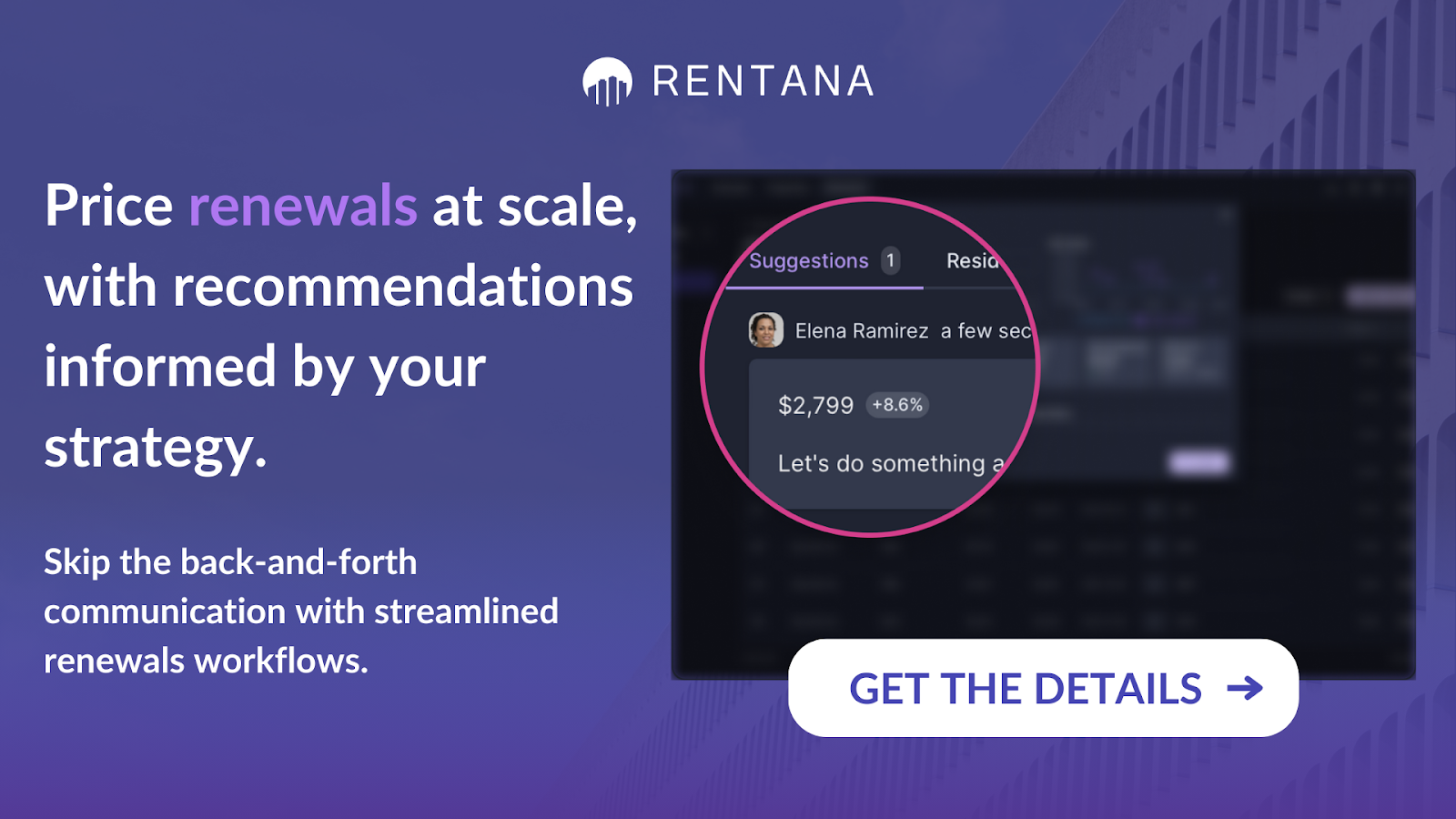




It’s real.
Multifamily owners and operators seek new ways to promote and streamline operations, and predictive pricing analytics is a pivotal shift. It shows how property management can leverage technology to directly make informed decisions to impact profitability.
At Rentana, we help you find new avenues for generating revenue and enhancing operational efficiency.
In this article, we’ll explore how multifamily owners and operators can benefit from predictive pricing strategies.

Predictive pricing analytics uses many data points, including historical rent prices, occupancy rates, and even local economic conditions, to forecast the optimal rent price for each unit in a portfolio. This level of precision in pricing is unprecedented and has several key impacts on the real estate market, including:
By setting the right price from the outset, multifamily operators can significantly increase their revenue potential. Predictive analytics ensures that each unit is priced according to its actual market value, considering factors such as location, amenities, and unit size. This dynamic pricing strategy prevents units from being undervalued or overpriced, protecting the operator's bottom line.
Automating pricing decisions streamlines operational processes, reducing the workload on property managers. With predictive pricing analytics, the guesswork in pricing is eliminated, allowing managers to focus on other critical aspects of property management, such as tenant satisfaction and property maintenance.
In an increasingly competitive market, the ability to swiftly adapt to changing conditions is paramount. Predictive analytics empowers owners and operators to adjust prices quickly in response to market shifts, ensuring their properties remain competitive. This agility can be a differentiator in markets where demand fluctuates regularly.
Perhaps one of the most significant impacts of predictive pricing analytics is its role in facilitating data-driven decision-making. By relying on comprehensive data analysis, property managers can make more informed decisions about pricing, lease renewals, and even future investments.
Predictive pricing analytics represents a leap forward in how multifamily operators approach pricing, promising increased revenue and operational efficiency and a competitive edge in a fast-paced market.
With solutions like Rentana leading the charge, the future of real estate pricing looks brighter and more profitable than ever. Don't just manage, excel. Level up your revenue intelligence with Rentana today. Visit our website to learn more and join the ranks of multifamily owners and operators who optimize their profitability and streamline operations with our revolutionary AI-powered platform.
Adaptive pricing strategies offer many benefits to multifamily owners and operators. The following points highlight the key advantages of implementing adaptive pricing strategies in the real estate sector:
Predictive pricing analytics enable property managers to make informed decisions based on comprehensive market data. By analyzing historical and current market trends, predictive models can forecast future demand, helping managers set optimal unit prices.
One of the core strengths of adaptive pricing strategies is their ability to adjust real-time rents based on market demand fluctuations. This flexibility ensures that rent prices are always aligned with the current market conditions, preventing revenue loss from underpricing or vacancies from overpricing. As a result, property managers can achieve a higher occupancy rate and increase their revenue potential.
In a market where consumers have easy access to price comparisons, being able to adjust pricing quickly is a significant competitive advantage. Adaptive pricing strategies allow property managers to respond rapidly to market demand changes.
Predictive pricing analytics significantly reduces the time and effort required for market analysis and pricing decisions. This automation streamlines operations and frees managers to focus on other critical aspects of property management, such as tenant relations and property maintenance.
Adaptive pricing strategies are inherently designed to mitigate risk. Property managers can avoid the pitfalls of emotional or speculative pricing by relying on accurate, predictive insights into market trends and demand. This methodical approach to pricing safeguards against revenue fluctuation and ensures stable growth for the property management company.

Finally, adaptive pricing strategies can contribute to stronger tenant relationships. By ensuring that prices are fair and reflect the current market, tenants are more likely to perceive property management as transparent and trustworthy. Additionally, the efficiency gains from predictive pricing analytics can enhance tenant satisfaction by enabling more responsive and attentive property management services.
Predictive pricing analytics are impressively efficient. Traditional methods of setting rental prices often involve cumbersome spreadsheet analysis and much guesswork.
Automation of this process drastically reduces the time required to adjust prices. It allows for real-time pricing adjustments in response to public market changes, ensuring property managers are always ahead.
Moreover, efficiency in this context also means the capability to manage lease renewals proactively. Predictive analytics provides insights into optimal renewal timeframes and pricing, ensuring that occupancy rates remain high while reducing the risk of income gaps due to unit vacancies.
By choosing predictive pricing analytics, multifamily owners and operators can level up their revenue intelligence, ensuring their business is not only prepared for today's challenges but also future-proofed for tomorrow's opportunities.
By harnessing the innovative capabilities of platforms like Rentana, multifamily property owners and operators can navigate the complex landscape of pricing and lease management with unprecedented precision and efficiency. Adopting AI-powered tools equips stakeholders with the ability to make informed, data-driven decisions, significantly enhancing their revenue potential and operational efficiency.
Predictive pricing analytics is a sophisticated approach that uses data-driven algorithms and machine learning models to forecast the optimal rental prices for multifamily properties. This innovative technology analyzes historical and current public market data to predict future real estate prices and trends, empowering property managers to set rent prices that generate revenue and occupancy rates.
Predictive pricing analytics significantly impacts revenue management by providing accurate and dynamic pricing strategies that adapt to public market changes. This allows property managers to set rental rates in real time, improving their ability to respond to demand fluctuations, minimize vacancies, and boost overall profitability. The precision and efficiency offered by predictive analytics streamline the revenue management process, ensuring properties are competitively priced to attract and retain tenants.
Predictive pricing systems analyze various data types, including historical rental rates, occupancy levels, public market trends, local economic indicators, and even seasonal demand fluctuations. Advanced algorithms process this data to identify patterns and insights that inform optimal pricing strategies. This comprehensive analysis ensures that pricing decisions are based on a holistic view of the relevant factors influencing the real estate market.
Yes, predictive pricing analytics can significantly help in promoting property values. Property owners and managers can achieve higher occupancy rates and rental income by employing dynamic pricing strategies that ensure properties are priced according to market demand and conditions. This not only enhances immediate revenue but can also bolster the property's long-term value by establishing a track record of high performance and desirability in the rental market.
Predictive pricing differs from traditional pricing strategies by relying on data analysis and machine learning to forecast future market trends and determine optimal pricing. Traditional methods often depend on manual research, past experiences, and static pricing models that do not adjust for real-time market conditions. On the other hand, predictive pricing offers a dynamic, data-driven approach that continuously adapts to changing market dynamics, providing a more accurate and responsive pricing strategy.
The benefits of using predictive analytics in real estate are extensive. They include improved revenue management through optimized and dynamic pricing, enhanced positioning by staying ahead of public market trends, increased operational efficiency by automating complex pricing decisions, and informed strategic planning through deep market insights. Additionally, predictive analytics can lead to higher tenant satisfaction by ensuring prices reflect the actual value and amenities of the property, fostering a balanced and fair rental environment.